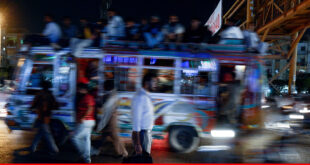Karachi is the most populous city of Pakistan and holds its place as the second largest city in the world by population. The city is home to people from various ethnic backgrounds; Sindhi to Urdu speaking and from Punjabi to Pakhtoon or Balochi.
It is the financial capital and 4th largest metropolitan city of the world accounts for the lion’s share of GDP and revenue. The city maintains itself as the premier centre of banking, industry, economic activity and trade. It is known to the world as the commercial and financial capital of Pakistan. It generates about 25 percent of the national GDP. It contributes 65 percent in generating the national revenue. Karachi was recognized as the most business-friendly city in Pakistan by World Bank.
It has the largest and powerful industrial complexes in the country such as Sindh Industrial & Trading Estate (SITE), Korangi Industrial & Trade Estate, FB Area, North Karachi Industrial & Trade Estate, Dhabeji and Port Qasim etc. SITE Manghopir is the largest industrial park of the country comprising about 4,000 factories.
It is an ideal location for the business. Here the industries produce a wide variety of goods, from textiles to chemicals, steel and machinery. The all-round industries of the city produces cement, corn mills, shipbuilding, refined oil, shoes and food.
Some major automobile manufacturing companies such as Toyota, Suzuki, Millat Tractors, Adam Motors and HinoPak and others have their manufacturing plants in the city. It is also home for plenty of cottage industries.
Most of Pakistan’s public and private banks, insurance companies have their head offices in Karachi. Many of Pakistan’s independent television and radio channels such as Geo, ARY, Hum and AAJ TV, KTN, Sindh TV are headquartered in Karachi.
It offers the scope for expansion of tertiary sector and retail trade. The largest stock exchange of Pakistan is situated in Karachi. Jinnah International Airport situated in Karachi is the largest international airport in Pakistan.
Karachi is a major sea transport centre and contains the country’s two major ports namely the port of Karachi and Port Mohammad Bin Qasim. It is an important hub for fishery business in Pakistan.
The major fish harbour in Karachi includes Karachi Fish Harbour and Korangi Fish Harbour. In Karachi, more than 300,000 people are connected with the fishery business and some subsidiary industries provide employment to about 400,500 people.
Information Technology (IT) industries, electronic media and call centers are playing a vital role in the current economy; the huge industrial base of the city provides the maximum strength to the economy of Pakistan.
Karachi’s input to the Pakistan is overall tax revenue. It is the business hub and former capital, attracts millions to its workforce and generates a lot of economic activity. Lot of it depends upon the security situation and if it improves there can be better economic prospects for everyone.
The country’s economic, manufacturing, services and other value addition takes place in Karachi. It has the advantage of being a port city, as well as housing head offices of major financial institutions.
It ranks on top on the basis of average overall tax collection between 2000 and 2012. It has an average of 62.4 percent followed by Lahore 13.63 percent, Rawalpindi 8.33 percent, and Multan at 5.50 percent and Peshawar at 3.3 percent.
The average of direct tax collection is almost the same, with Sindh being the highest with 64.97 percent, Punjab with 30.93 percent, Khyber Pakhtunkhwa with 3.24 percent and Balochistan with 0.86 percent. Karachi dominates with an average 61.49 percent, followed by Lahore, Rawalpindi, Multan and Peshawar with 17.33 percent, 4.30 percent, 3.65 percent and 3.03 percent, respectively.
Indirect tax collection statistics are also similar as direct taxes with Karachi dominating with an average 62.79 percent, followed by Lahore, Rawalpindi, Multan and Peshawar.
Millions of migrants from other provinces come to Karachi to earn their living. Billion is remitted to their families based outside Karachi. These remittances make the difference between a family’s survival and a life of despair due to no earning opportunities available to the migrants in their localities or cities. Most of it is tax-free for migrants, but no doubt these remittances accelerate economic activity in areas outside Karachi.
According to FBR data (as of December 9, 2014), 881,262 tax returns were filed across the country. Karachi leads this list by a wide margin.
Karachi is famous for its economic and financial activities. The State Bank of Pakistan and Stock Exchange are one of the examples of economic significance of Karachi.
In 1960s Karachi has been an economic role model for many countries in the world. Many countries sought to emulate Pakistan’s economic planning strategy and one of them, South Korea, copied the country’s second “Five-Year Plan”. The World Financial Center in Seoul is said to be designed and modeled after Karachi.
The city remained largely safe from the worst kind of militancy, suicide attacks, bomb and blasts that afflicted the country especial the northern parts during the last four years.
Unfortunately the city has been struck in the past with targeted killings, ethic and secretarial clashes, turf war by different political and criminal groups, extortion activities, bank dacoities, robberies and other street crimes.
The ongoing energy crisis has had its detrimental impact on the economy of the country; the persistent law and order situation in the port city of the country has taken and is still taking a punishing economic toll.
 PAGE Blog Business Weekly Magazine
PAGE Blog Business Weekly Magazine

